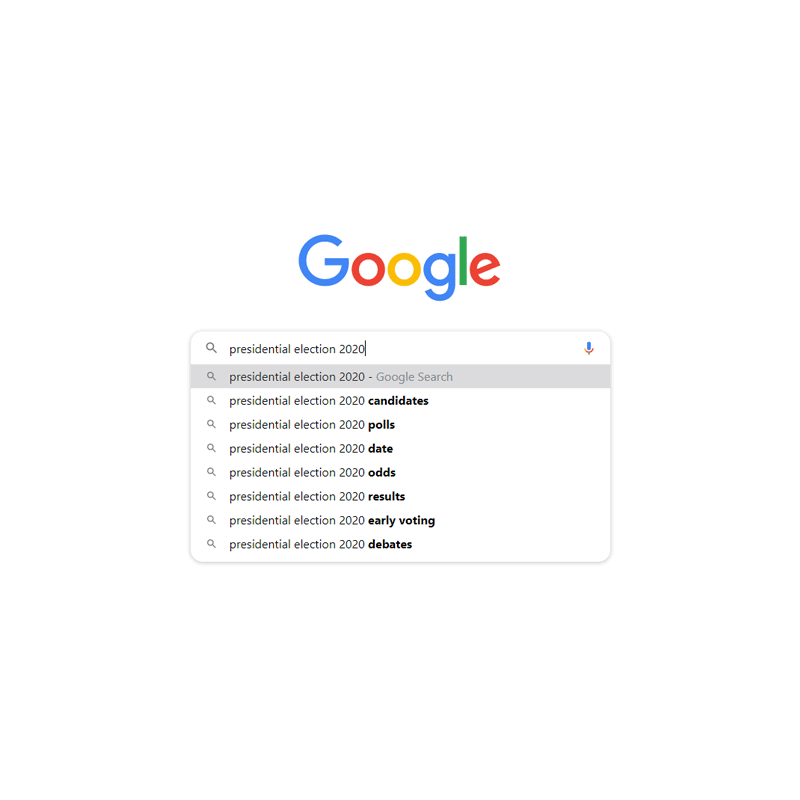
In terms of political sociology, political interest is the main part of political motivation.
It's the basis of both democratic political belief system and identity achievement, as the outcome would be the process of identity development. It's a complex term, in which is the basis of democratic governance.
In a form of government where political decisions are made by the entire body of qualified citizens, the people of the government should be selected through elections. This enables voters to select their leaders, and hold them accountable for their performance in office.
Things are easier to say than done, especially when information flows rapidly on the internet.
Google as one of the top of the internet-information food chain, has gotten itself in trouble for its algorithms, or how it ranks websites according to users' interest, for more than several times.
For example, its search engine's Autocomplete can sometimes surface amusing things. In worse case scenarios, there are times that it can steer people towards problematic concepts and fake news.
After all, the suggestions Google is showing, are based on what other people are searching for.
But when things get political, Google wants to play safe. And it restarts in 2020.
Google is tweaking its Autocomplete feature to remove some suggestions, particularly those that are politically sensitive, even if they are true.
This isn't the first time Google is doing this.
Back in 2016, the company said that its “Autocomplete does not favor any candidate or cause.” The company said that when it was accused of hiding negative Autocomplete results about Hillary Clinton.
This time, Google is taking a slightly different approach: instead of making sure that search results for political candidates and parties aren’t biased, Google is simply removing search suggestions that could favor either party or candidate.
The company showed a few examples in its blog post, saying that things like "you can vote by phone" as well as "you can't vote by phone," or a prediction that says "donate to" any party or candidate, should not appear in its Autocomplete.
"We expanded our Autocomplete policies related to elections, and we will remove predictions that could be interpreted as claims for or against any candidate or political party," Google said, without saying that it will be automatically or proactively making sure it never happens to begin with.
Read: Preparing For The 2020 U.S. Presidential Election, Google Removed Over 300 Donald Trump Ads

On the blog post, Google also highlights some other things too.
- New insights from Intelligence Desk: Google has developed an Intelligence Desk, which actively monitors and identifies potential information threats.
"This effort grew out of our Crisis Response team, which for years has done real-time tracking of events around the world, launching SOS Alerts in Search and Maps to help people get vital information quickly. Over the years, we’ve monitored thousands of events and launched hundreds of alerts to help keep people safe."
- Improving its systems for breaking news and crises: Google acknowledges that people’s need for information can accelerate faster than facts can materialize.
This is why it is improving its systems to automatically recognize breaking news around crisis moments like natural disasters and ensure it can return the most authoritative information available.
"We’ve also made significant strides in our overall ability to accurately identify breaking news moments, and do so more quickly. We’ve improved our detection time from up to 40 minutes just a few years ago, to now within just a few minutes of news breaking."
- Providing accurate information from the Knowledge Graph: To improve the quality of Knowledge Graph, Google said that it has partnered with government agencies, health organizations and Wikipedia "to ensure reliable, accurate information is available, and protect against potential vandalism."
"For COVID-19, we worked with health organizations around the world to provide local guidance and information to keep people safe."
- Helpful context from fact checks and Full Coverage: Google has introduced fact checks and labels for "helping you easily understand the context behind information you might find online."
Google has also updated its search engine using its BERT language understanding model to make it better in matching news stories and available fact checks.
Google is constantly making tweaks to its search engine algorithms to deliver better results. This mostly works behind the scene.
"Information online is constantly changing—as are the things people search for—so continuing to deliver high-quality information is an area of ongoing investment," Google said.